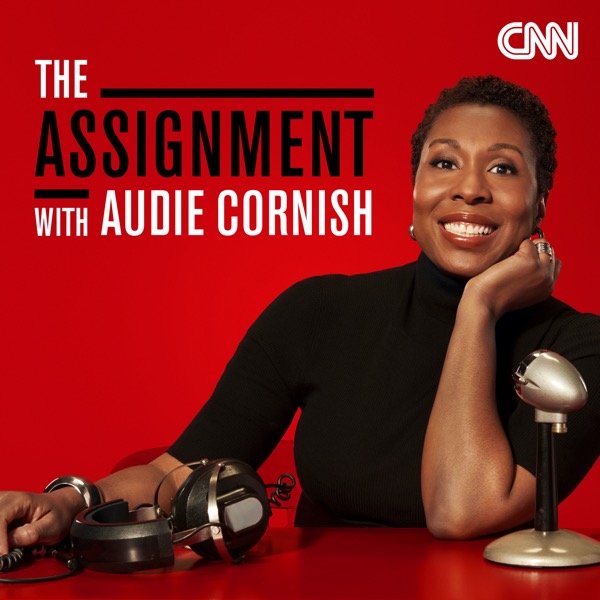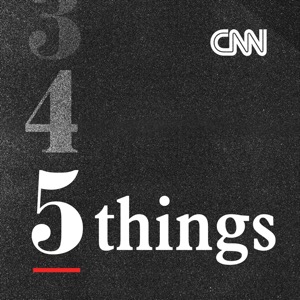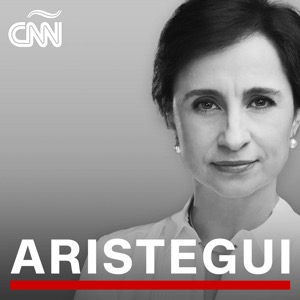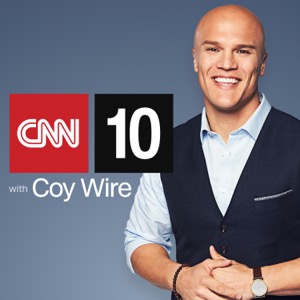podcast
The Assignment with Audie Cornish
Every Thursday on The Assignment, host Audie Cornish explores the animating forces of this extraordinary American political moment. It’s not about the horse race, it’s about the larger cultural ideas driving the conversation: the role of online influencers on the electorate, the intersection of pop culture and politics, and discussions with primary voices and thinkers who are shaping the political conversation.

LeVar Burton on Optimism During Hard Times
The Assignment with Audie Cornish
Sep 5, 2024
Audie talks with actor and producer LeVar Burton about the political events that shaped his life and informed the way he guided younger generations, especially as they grappled with the political and cultural events of their own time.
Episode Transcript
Audie Cornish
00:00:00
So you have a lot of projects going on at once.
LeVar Burton
00:00:03
Kunta's busy.
Audie Cornish
00:00:04
Yeah.
Audie Cornish
00:00:05
You know this voice. If not as Kunta Kinte of the 70s era miniseries roots, then as host of the 80s era kid show Reading Rainbow, or the 90s era Star Trek: The Next Generation. But some of you have written in asking about how to deal with the anxiety and stress of this election year. So I'm bringing in someone I trust to help.
Audie Cornish
00:00:27
What I want to do, in a way, is talk to you about your political awakening, so to speak, how you came to be where you are now, at this very... and being what I call a gentle messenger of a lot of interesting ideas. So that's how I'm going to approach it. I hope you don't mind.
LeVar Burton
00:00:50
I think it's it's refreshing. Good point of view for an interview.
Audie Cornish
00:00:55
Yeah. No, no, I think it's it's not just going to be like, what was the director like? Like, we don't care about that. We have a lot of...
LeVar Burton
00:01:02
Why should I be surprised?
Audie Cornish
00:01:03
Oh.
LeVar Burton
00:01:03
It's Audie Cornish.
Audie Cornish
00:01:05
And this is the assignment for this episode. The actor and producer LeVar Burton on the political events that shaped his life, and how that informed the way he guided younger generations through the political and cultural events that changed them. Stay with us.
Audie Cornish
00:01:34
I never wanted to be on TV until I saw the kids doing book reviews on the PBS show Reading Rainbow. I mean, I was basically a feral latchkey kid spending afternoons in the library. So these were my people.
Reading Rainbow clip
00:01:48
So read Jumanji! I promise you, you won't be among the bored and restless.
Audie Cornish
00:01:55
And even when I was too old to watch, I would cross paths with an episode that would shock me with its smarts and empathy and directness.
Reading Rainbow clip
00:02:05
How are you guys? How are you doing that? And if it's all right with you? I wanted to talk a little bit about what happened on September 11th. Is that all right with you guys? Yeah.
Audie Cornish
00:02:19
Like this one that aired a year after the 9/11 attacks, Burton is talking with kids from 234. An elementary school just north of the World Trade Center.
Reading Rainbow clip
00:02:31
It was just scary because they saw, like, lots of debris coming out, and I saw the fire. I was also worried that my mom and like so I just like really stressed.
Audie Cornish
00:02:42
I was thinking about this as I watched the documentary Butterfly in the Sky on Netflix. How did LeVar Burton come to be this person who helped kids? I mean, us, understand the unimaginable events that shape our politics and culture.
LeVar Burton
00:02:58
I'm LeVar Burton, and I'm the son of a political activist. And English teacher.
Audie Cornish
00:03:08
So we always hear about...
LeVar Burton
00:03:09
And social worker.
Audie Cornish
00:03:09
The English teacher. Which is your mom, right?
LeVar Burton
00:03:12
Yeah, right.
Audie Cornish
00:03:13
What was her name?
LeVar Burton
00:03:15
'Erma. E-r-m-a. Erma Gene. G-e-n-e. She had the masculine spelling of her name. And her her maiden name was Ward. Nee Burton. Nee Christian.
Audie Cornish
00:03:28
And the political activist?
LeVar Burton
00:03:30
She was, you know, her last career as a social worker put her right in the middle of. We were from Sacramento, California. State capital. Hard to grow up in a state capital without having some sort of political awareness. But mom was always. She was always a precinct captain on election day. She was very, very, very much involved, in politics of her union. I inherited, an awareness that politics are a part of everything.
Audie Cornish
00:04:02
You are ageless. So I don't actually know where you are in our historical spectrum.
LeVar Burton
00:04:09
In elementary school, I was in the second grade when Kennedy was assassinated. I was in middle school when both Martin Luther King and Robert Kennedy were assassinated. On a local level, there were, you know, the the black voice in Sacramento politics. And in state politics in general. Was only beginning to, to assert itself.
Audie Cornish
00:04:35
How did your family explain political assassinations to you?
LeVar Burton
00:04:40
How can you explain that to a child? You know, there was a lot of weeping. On an on a national level by the time. By the time Bobby got assassinated, we had become. At least I had become oddly accustomed. I mean, it's weird to say...
Audie Cornish
00:04:57
I know. I know, that's...
LeVar Burton
00:05:00
But it was a part of my life. I mean, as black people, we were always forced to respond to the changing tides of, of movement in America. And I grew up in, an era where, black people were taking responsibility for their own state of being in this nation.
Audie Cornish
00:05:20
We were sort of being pressed to do so as well nationally. Right. Like the Moynihan Report comes out and it's like, turns your family into pathology. Like, there was just this way of looking at Black America and its ills at that time. That was fascinating, to say the least, given the decade prior.
LeVar Burton
00:05:42
Yeah. But, you know. Yeah, I agree. And is it really can we really be surprised, by anything that happens politically in this country, especially given where we are.
Audie Cornish
00:05:56
We are. You know, we get a lot of letters to the show, and I get a lot of comments when I meet people in the world and they're like, I'm just feeling like anxiety or frustration or despair about the state of the country. In a way, that's why I wanted to start there with you, because I'm often telling people like, well, we have been through this as a country before, and we've it's been a little bit worse, even in many ways. So I'm fascinated by like Reading Rainbow Guy being in the second grade for this tremendous earthquake of a cultural moment, which is a Kennedy assassination.
LeVar Burton
00:06:34
Right.
Audie Cornish
00:06:35
I mean, I was traumatized from the challenger blowing up, right? So, like, I just can't imagine how that shapes a household and shapes a kid.
LeVar Burton
00:06:45
I watched Lee Harvey Oswald killed on live television.
Audie Cornish
00:06:54
Still a kid. Still baby LeVar.
LeVar Burton
00:06:59
Yeah. But for me and others of my age is part and parcel of the growing up experience in America. No matter what side of the color line you land on. We all experience that and and it it and I do believe in it. It had an impact right? It had an impact.
Audie Cornish
00:07:22
You start to take the path towards the priesthood. Correct? Were you interested in religion? So it's interesting that, yeah, you have this childhood like all the culture where there is such turmoil, and you lean deeper into your religious instincts, it sounds like, which as a young man is, like, pretty, not unusual. But yeah, maybe a little unusual.
LeVar Burton
00:07:50
Here's here's the thing. What is the sane response to, to the hate? Love.
Audie Cornish
00:08:01
For some people was riots.
LeVar Burton
00:08:03
Yeah, right. And that is a response. Just wasn't mine.
Audie Cornish
00:08:08
Did that have to do with your parents?
LeVar Burton
00:08:10
That had to do with my mother. Yeah. My mother wasn't a Catholic. My mother was not a Catholic. I was in Catholic school because of the educational opportunities. However, in that environment, you know, you can't help. But if you're if you're if you're in that culture, you can't help but absorb it. Right? So I was baptized, a Catholic because my mother wanted me to have the best education.
Audie Cornish
00:08:36
Interesting. Yeah, that doesn't mean you have to take to it, though, right? Like you found something in it. Well, as a young person.
LeVar Burton
00:08:42
I did find something in it. And I entered the Catholic seminary at 13.
Audie Cornish
00:08:46
What? That was not in the Wikipedia entry. So I I've learned something here.
LeVar Burton
00:08:52
Yeah, I felt like I this was what I was supposed to do with my life. And I pursued it rigorously. And it was only by immersing myself in that culture that I discovered that, oh, wait a minute, there's more of the world out there that I need to taste. I need to explore, I need to experience.
Audie Cornish
00:09:13
This is also happening, though, as the black civil rights movements, right? Is going through real scrutiny.
LeVar Burton
00:09:20
The year I graduated from from high school, my draft number would have come up had the draft not ended months before, like 3 or 4 months before I graduated from St Pius. So it was a tumultuous time, and I and I and I had one of those, you know, one of those moments of epiphany in the mirror in the bathroom.
Audie Cornish
00:09:48
Really?
LeVar Burton
00:09:49
Most epiphanys for me take place in the bathroom. And I remember very distinctly, you know, just really scrutinizing my image in the glass and saying to myself, you know, I think I can do this. I think I can be a professional actor. I can make a living out of this. At least I can try and give it my best, because my passion had been ignited and it was and it was it was a relief to have found, a direction, because saying no to the to the priesthood was, was not easy.
Audie Cornish
00:10:31
Yeah. Plus, everything else that's going on. Right. You say no to the priesthood. You've just missed the draft. Like it just I can imagine feeling like, whoa, where am I supposed to be in this world?
LeVar Burton
00:10:43
But that. But the point was, I wanted to be out in the world. I didn't want to be in a cloistered environment. I didn't want to be behind gates. I wanted to be out in the world. Right? And so that was the decision that I made and why?
Audie Cornish
00:10:59
One of the things I've come to learn as an interviewer is that we're pretty terrible at talking to artists about their projects when they're on those junkets. Right? And I have always wondered what it was like for you as a young actor. This is your first job. It becomes immense, but it becomes immense around this project that is so politically and culturally fraught. And I can't imagine the kinds of questions you were asked, you know, on talk shows or newspapers, you know, as people are kind of like slavery was bad. Tell us more, you know. But maybe I'm, being down on my profession. What? How old were you? What was it like?
LeVar Burton
00:11:44
I was I was 19.
Audie Cornish
00:11:46
Oh. Every time I picture you that, I' m just like, oh, he's so young. He's so young.
LeVar Burton
00:11:51
I was. I really, really was. It was an opportunity, to talk about the endowment ability of the human spirit.
Audie Cornish
00:12:02
But were you ready for that? You were 19.
LeVar Burton
00:12:04
Yeah. No, I was absolutely down for the conversation. Look, I felt like I had been preparing for Kunta my whole life, right? There was no research necessary. From the very first moment I read the very first scene, I knew who that kid was. What he thought, how he thought, why he thought, what he thought. I was ready emotionally, intellectually, I was ready.
Audie Cornish
00:12:34
Were people ready to have that conversation with you?
LeVar Burton
00:12:40
Not the way they're ready today.
Audie Cornish
00:12:43
Interesting. Can you give me an example?
LeVar Burton
00:12:46
I'm having a different conversation with journalists about race today than I did back in 1977. That's because of the nature of the shift in the nation, not in me. I've maintained my consistent belief. That our period of enslavement, in addition to being the original sin of Ameri—That's the it's part of the original sin. The original sin of America is taking shit that doesn't belong to you. And pretending like that's okay. The original sin of America is enslaving people for their labor, treating them in a subhuman way because it makes you money, and pretending that that's okay. My feelings about this country. Its foibles and its fineness have never really changed. But I've known from the time I was a kid, Audie Cornish, that I would have to fight. Alongside others of a similar mindset. I'd have to fight for the rights of people who look like me. And luckily I was given a tool called storytelling. That has been the great blessing of my life. That I am able to use storytelling as a teaching tool. It's the greatest privilege I can think of.
Audie Cornish
00:14:19
Was there a time it ever felt like a burden?
LeVar Burton
00:14:26
No.
Audie Cornish
00:14:28
I asked because sometimes people I remember during what I jokingly call the Awakening people would talk about being like, oh, I'm the black person in the office or the Latino person in the office. And so now all of a sudden they're like, we're having a committee on such and such. Can you do it? Like people kind of felt a little bit burdened by it, like I'm not in charge of helping to solve racism.
LeVar Burton
00:14:48
At St. Pius, they decided all of a sudden in my second or third year, that they were going to have a black studies course. And I was like, all right, fine, you know, but this is of course, I don't need to take. But they insisted that I take it because I was the all raisin in the oatmeal. Okay?
Audie Cornish
00:15:09
Did they expect you to, like, weigh in or just. I mean, I've been in that kind of class. I got to be completely honest. Like when you were in, I remember being in, like, advanced placement classes in school, and all of a sudden you're reading Invisible Man, and I'm like, we're not equipped to have this discussion. The teacher and the kids. I don't want to be here.
LeVar Burton
00:15:29
Yeah.
Audie Cornish
00:15:29
But you, you're okay with being there like you. It does seem to me like in your career. Again, we're cherry picking, right? Because a role like Geordi on Star Trek is like somebody who is an ambassador of sorts of ideas. That's kind of how Star Trek works. So in my mind, you're like a guy who's okay with that burden.
LeVar Burton
00:15:54
Yeah, I've never thought of it that way, but, I suppose it's true. I'm. I am okay being being that voice in the room, being that presence in the room. I have moved in spaces where I am the raisin in the oatmeal my entire life, and I believe you have to.
Audie Cornish
00:16:15
Yeah. For sure.
LeVar Burton
00:16:18
And so I don't consider it a burden. It's just my life.
Audie Cornish
00:16:22
Yeah.
LeVar Burton
00:16:25
It's simply my life. And I love my life. Every single day. I've come to the conclusion that my job is to be LeVar Burton. And. And that's what I do. And what that means to me is that I show up every day as my authentic self. I don't change for the audience. I am consistently me. And I and I and I, I believe that over time I have demonstrated exactly that over almost 50 years of being part of popular culture in America at the level at which I've been able to express it.
Audie Cornish
00:17:20
Coming up. LeVar Burton recently discovered the history of his own roots, how that affected his work. Back in a moment.
Audie Cornish
00:17:36
There's one other part of your history I was interested in, which is. And you can tell me if I'm wrong, but I was reading that you have a great great grandfather who was a public servant, during reconstruction.
LeVar Burton
00:17:53
Arkansas legislator.
Audie Cornish
00:17:54
'Yeah. So I don't think a lot of people appreciate this history, this post-Civil War history. The Reconstruction Act of 1867 gave black men and former Confederate states the right to vote. I've read a lot about this because there actually were all of these legislators in the South. Black legislators. And of course, life was not made easy for them. Is this history you knew about growing up?
LeVar Burton
00:18:18
Not until very recently. Skip gates did did my genealogy, for finding your Roots.
Audie Cornish
00:18:26
Yeah of course. Should've known. When in doubt, Skip gates. Right? Yeah. No, but that's...
LeVar Burton
00:18:31
Skip Gates is involved.
Audie Cornish
00:18:32
But that's fascinating.
LeVar Burton
00:18:34
It is, it is. I mean, it was it was an experience that literally changed my life. I felt very much a part of this nation before I found out this information. But now I have receipts. I have receipts. Yeah. I have an ancestor who was a member of the Arkansas legislature. Proposed a bill to provide money for a school. Wasn't passed, but he proposed legislation, which is more than I can say for a lot of politicians in the current political picture. I found out that on my father's side of the family, I thought all of my impulse towards education came from my mother, Erma, first person in her family to go to and graduate from college. Her first degree was in English language literature. Her second was a master's in social work. I thought all of my impetus towards education came from her. Come to find out, I have not only educators on my father's side of the family. I have ancestors who started schools, who were superintendents of schools. One for high school, one for elementary school. In Arkansas. Come on.
Audie Cornish
00:19:53
In the late 1800s.
LeVar Burton
00:19:56
Hello!
Audie Cornish
00:19:57
Because that world of people, those societies, we don't know them the way we could and should. Because as we know, with the violence that came after in the early 1900s, red summers, etc., a lot of them were in effect shut down, splintered. A lot of those men...
LeVar Burton
00:20:19
Silenced.
Audie Cornish
00:20:20
...left office.
LeVar Burton
00:20:21
Yeah. Silenced. Yeah, absolutely. My ancestor Hal B. Burton, who was in the Arkansas Assembly. Was not reelected, unsurprisingly, to a second term, and went on to have different careers as a farmer, a tavern owner. I mean, you know, he continued to reinvent himself and stay vital in a world that was hostile to his presence. That is what I learned as a kid. That's what we do, That's what we do. We adapt and survive. And live to fight another day.
Audie Cornish
00:21:07
It sounds like this. Did this reframe some of how you've, carved out your own career, like this context of him, these ancestors, did it make it look at make you look at how you've, made a way?
LeVar Burton
00:21:23
Yes. It does. It absolutely does. Because I don't I don't believe in accidents. I think that all energy in the world has purpose. It's not capricious at all. And so. I believe there is purpose to my life. And I've always felt that there was a purpose to my life. You don't enter, you know, the ministry at the age of 13. If you don't feel that there is purpose in it. I believe that that is the responsibility of every human being to discover what their purpose in life is, and then pursue that with all the passion you can possibly muster. But because that's the energy that propels us to the next level. That's going to get... That's what's going to take us from where we are to a...to a star faring species. Everybody rising to their best is is the goal, is the vision. Is the dream.
Audie Cornish
00:22:29
I was listening to you, I think you were, it was from clipped. Right. And this little one went viral where you talked about keeping your Kunta Kinte... You know, prop chains...
Clipped show clip
00:22:46
You know, the the chains I wore in roots. I keep them over the hearth in my living room, right above my 12 Emmys. What is that about? Oh, what what is it to you? America first met me as Kunta Kinte, a young African kid who was kidnaped, tortured, refused his slave name. Then I read to their children and maintain the integrity of their favorite spaceship. Yeah. Pretty soon people began to think of me as safe. Oh. The safest. Once I read Go the f**** Sleep for charity. Yeah. One of my brand partners dropped me what you can't even say f***. I can. But there are consequences. I said f*** I lost money. If I showed how angry I really am. But I'm not going to hide it. So I keep my chains on the wall in the living room. I want my guests to know, while I am unquestionably their friend. I am also absolutely filled with rage.
Audie Cornish
00:24:06
Can you talk about that? Safe versus not safe. I think as a Black man in entertainment, that has very specific connotations. And you're not the first person I've, I've heard talk about it like a Wayne Brady willl talk about that. What do you mean by being seen as safe?
LeVar Burton
00:24:25
'Non-threatening? You know somebody who who encourages kids to read, right. Is is naturally. And I would, I would say justifiably, seen as, as a benevolent prevalence. Right. Especially given that, you know, I was so transparent on Reading Rainbow with who I was. Right? And, and as was pointed out in the documentary, I was really insistent on on being exactly who I was. I was not open to notes about changing who I was from the producers in order to fit their idea of what a children's television host should be. They hired me, and I insisted that that's what they got, and I wasn't going to compromise like they didn't want me. They did want me to have an earring when I got my ear pierced. They didn't want me to change my haircut as I went through fads and styles. I was simply being my authentic self, which has been and is and always will be. Critically important to me.
Audie Cornish
00:25:34
But it's hard. I mean, and I just want to say that for the audience hearing it, because as I go through something like this now as we speak, I'm trying to figure out how do I remain true to myself in the public space when I'm not used to it?
LeVar Burton
00:25:49
Right.
Audie Cornish
00:25:51
There's all kinds of pressures coming from different directions. The part of you that wants to keep parts of yourself close to yourself.
LeVar Burton
00:25:58
Sure.
Audie Cornish
00:25:59
The part of you that is being told by someone outside of you what you're like. Or suggesting things that sound suspiciously like what they think a Black person is like. It's nothing to do with you, right. Like you're saying something that like you did, but it actually I can imagine there were a lot of mirror talks on the way to figuring that out.
LeVar Burton
00:26:23
Yeah. I'm a big fan of therapy. No, seriously. I am.
Audie Cornish
00:26:35
No, I get it. Look, because you do feel like. Am I crazy? Am I like someone? You're asking me to do this and that? Like, am I like you? You question yourself. And really fundamental ways. And and especially when there's just this kind of, you know, double consciousness, this history hanging around you of, like, you being a person of color and you're dealing with your own expectations, but also the expectations and stereotypes of others.
LeVar Burton
00:27:07
Yeah. Yeah.
Audie Cornish
00:27:10
What is it that you want people to know now because you've got this great podcast, LeVar Burton Reads and some of those selections. I'm like, okay, LeVar, like, there's a little bit of education going on here. There's some very pointed titles.
LeVar Burton
00:27:28
And commentaries, post posts, story. I needed a microphone in a story. That's it. And when I decided to do the podcast, I decided that I wanted to do a podcast where I read short fiction in every episode. One piece of short fiction. I love short stories. I think it's an absolutely genius format for a writer to express themselves in coming up with a satisfying story beginning, middle, and end with compelling characters in 30 pages as opposed to 230.
Audie Cornish
00:28:03
The discipline of it.
LeVar Burton
00:28:07
And given that it was my podcast, I decided that I wanted to introduce the audience. By the way, an audience of adults who grew up on Reading Rainbow. So they are used to me giving them recommendations about literature. So I wanted to share my tastes with them, which leaned towards the speculative in science fiction. That's just me. I'm a nerd. But I wanted to introduce the audience to voices that they would not ordinarily have been exposed to. Writers like Percival Everett. Right? because that I see that as a part of my reason for being. I have been able, Audie, in the span of these what is it... 46? 47? Whatever it is, years to express. The journey of black people in America, from our enslavement to the stars and LeVar, the Reading Rainbow guy. The guy that that hosts LeVar Burton reads the podcast. He's absolutely in the middle of that continuum. There's Kunta, then followed by LeVar, followed by Geordi. And I see this, journey as having been an absolute privilege. To acquaint the world with an identity of a Black man that they may not be familiar with. And expand their idea of who and what we are. As people, because so much of the energy has gone into denigrating us and marginalizing us and downright debasing us, calling us inhuman and justifying that with bullshit science. So I take my job, my responsibility, I take my life...well, I'll say this. I don't take it lightly.
Audie Cornish
00:30:30
Actor and producer LeVar Burton. His podcast is called LeVar Burton Reads the documentary on Reading Rainbow Butterfly in the Sky is streaming now on Netflix, and he will be hosting a new game show based on the game, Trivial Pursuit that's on the CW.
Audie Cornish
00:30:47
'One more thing. We're taking the show on the road. We are trying to find out the political stories that matter to you, and we need your help. So call. Leave us your assignments at (202) 854-8802, because we'd like to come out and visit you and talk about the politics of our time.
Audie Cornish
00:31:12
This episode of The Assignment was produced by Lori Galarreta. Our senior producer is Matt Martinez. Dan Dzula is our technical director, and Steve Lickteig is executive producer of CNN audio. We had support from Haley Thomas, Alex Mannaseri Robert Mathers, John Dionora, Lenny Steinhardt, Jamus Anderus, Nicole Pesaru, and Lisa Namero. Special thanks, as always, to Katie Hinman. I'm Audie Cornish. Thank you for listening.



